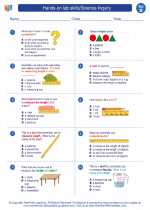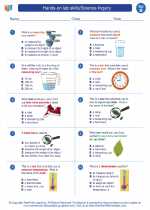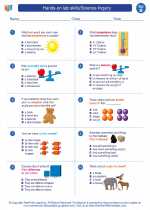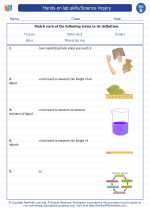Hands-on lab skills/Science Inquiry -> systems
Systems
A system is a group of interacting, interrelated, or interdependent elements forming a complex whole. In science, a system is a set of connected parts or components that work together to achieve a specific goal. There are various types of systems, including biological systems, ecological systems, and mechanical systems.
Types of Systems:
- Biological Systems: These are systems found in living organisms, such as the respiratory system, circulatory system, and nervous system.
- Ecological Systems: These systems involve the interactions between living organisms and their environment, including ecosystems, food webs, and environmental cycles.
- Mechanical Systems: These systems are made up of mechanical and moving parts, such as engines, gears, and levers.
Key Concepts:
When studying systems, it is important to understand the following key concepts:
- Components: The parts or elements that make up a system.
- Interactions: The ways in which the components of a system work together or affect one another.
- Input and Output: The materials, energy, or information that enters and leaves a system.
- Feedback: The process by which the output of a system is returned as input, potentially influencing future outputs.
- Emergent Properties: Characteristics or behaviors of a system that arise from the interactions of its components, rather than from any individual part.
Study Guide:
Here are some key points to focus on when studying systems:
- Identify examples of different types of systems and their components.
- Describe the interactions between the components of a system.
- Explain the input and output of a given system and how they contribute to its function.
- Understand the concept of feedback and its importance in maintaining the stability of a system.
- Discuss emergent properties and how they contribute to the behavior of a system as a whole.
By mastering these concepts, you will develop a deeper understanding of systems and their role in various scientific disciplines.
.◂Science Worksheets and Study Guides Second Grade. Hands-on lab skills/Science Inquiry
Study Guide Hands-on lab skills/Science Inquiry
Hands-on lab skills/Science Inquiry  Worksheet/Answer key
Worksheet/Answer key Hands-on lab skills/Science Inquiry
Hands-on lab skills/Science Inquiry  Worksheet/Answer key
Worksheet/Answer key Hands-on lab skills/Science Inquiry
Hands-on lab skills/Science Inquiry  Worksheet/Answer key
Worksheet/Answer key Hands-on lab skills/Science Inquiry
Hands-on lab skills/Science Inquiry  Vocabulary/Answer key
Vocabulary/Answer key Hands-on lab skills/Science Inquiry
Hands-on lab skills/Science Inquiry 

 Worksheet/Answer key
Worksheet/Answer key
 Worksheet/Answer key
Worksheet/Answer key
 Worksheet/Answer key
Worksheet/Answer key
 Vocabulary/Answer key
Vocabulary/Answer key

The resources above cover the following skills:
PHYSICAL SCIENCE (NGSS)
Matter and its Interactions
Students who demonstrate understanding can:
Plan and conduct an investigation to describe and classify different kinds of materials by their observable properties.
Analyze data obtained from testing different materials to determine which materials have the properties that are best suited for an intended purpose.